CHCCSM005: Develop, Facilitate and Review Case Management Assessment
VerifiedAdded on 2020/06/06
|45
|15191
|836
Homework Assignment
AI Summary
This document presents a completed assessment book for the CHCCSM005 unit, focusing on developing, facilitating, and reviewing all aspects of case management. The assessment covers various functions of case management, including counselling, coordinating, and advocacy. It explores the case management process, emphasizing the roles of assessment, planning, and implementation, and highlights the importance of client participation and engagement. The assignment also delves into key considerations such as family dynamics, laws and regulations, resource identification, and the application of behavior change models like the stages of change. The assessment requires the student to demonstrate their understanding of these concepts through short-answer responses, true/false questions, and table completion, providing a comprehensive overview of case management principles and practices.
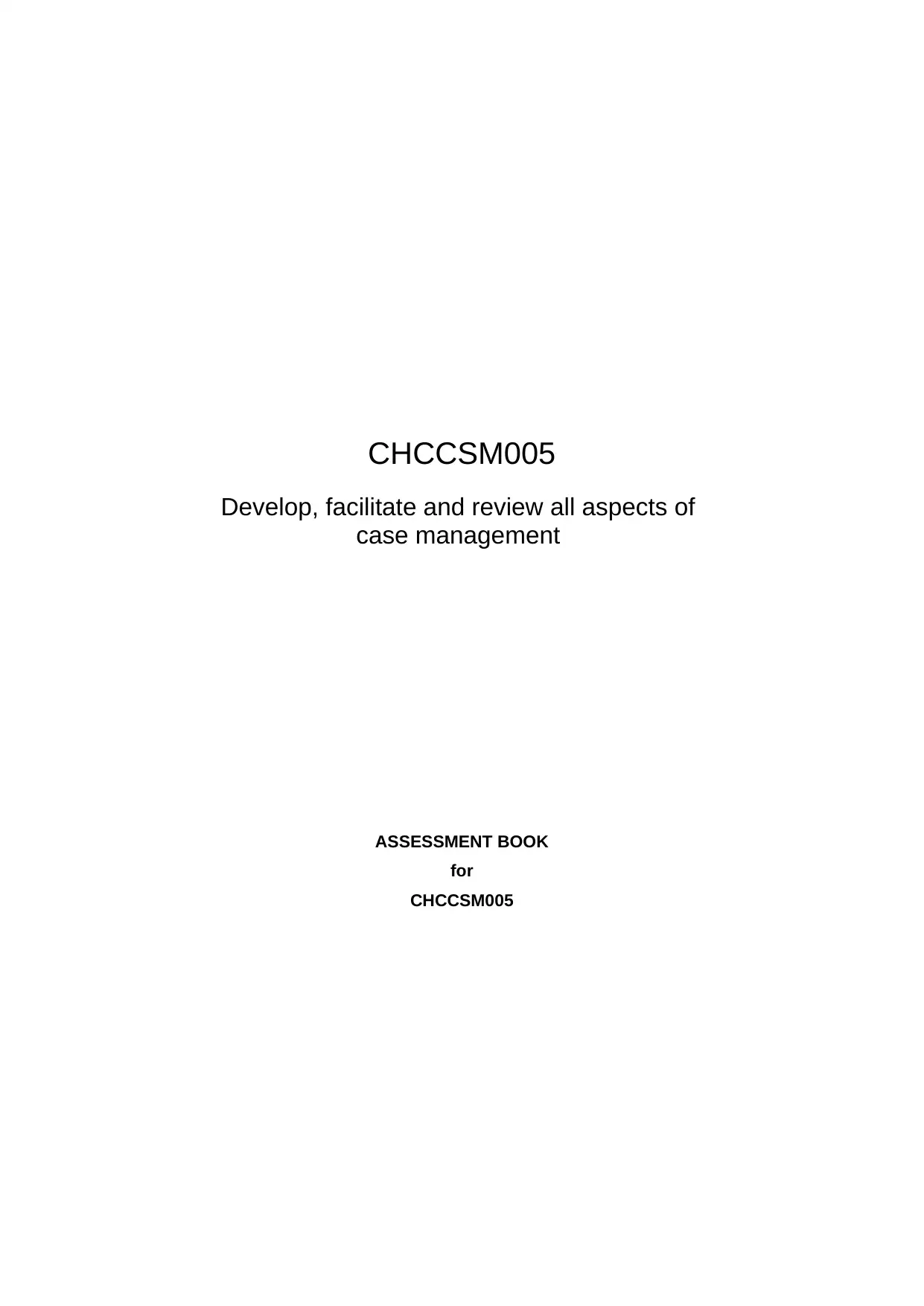
CHCCSM005
Develop, facilitate and review all aspects of
case management
ASSESSMENT BOOK
for
CHCCSM005
Develop, facilitate and review all aspects of
case management
ASSESSMENT BOOK
for
CHCCSM005
Paraphrase This Document
Need a fresh take? Get an instant paraphrase of this document with our AI Paraphraser

This book is copyright protected under the Berne Convention.
All rights reserved. No reproduction without permission.
This book is protected by copyright and may not be reproduced or copied either in part or in
whole nor used for financial gain without the express approval in writing of the owner (Life
Coaching Institute (Aust) Pty Ltd ATF Life Coaching Institute Trust ACN 099 379 352) of the
copyright.
All rights reserved. No reproduction without permission.
This book is protected by copyright and may not be reproduced or copied either in part or in
whole nor used for financial gain without the express approval in writing of the owner (Life
Coaching Institute (Aust) Pty Ltd ATF Life Coaching Institute Trust ACN 099 379 352) of the
copyright.
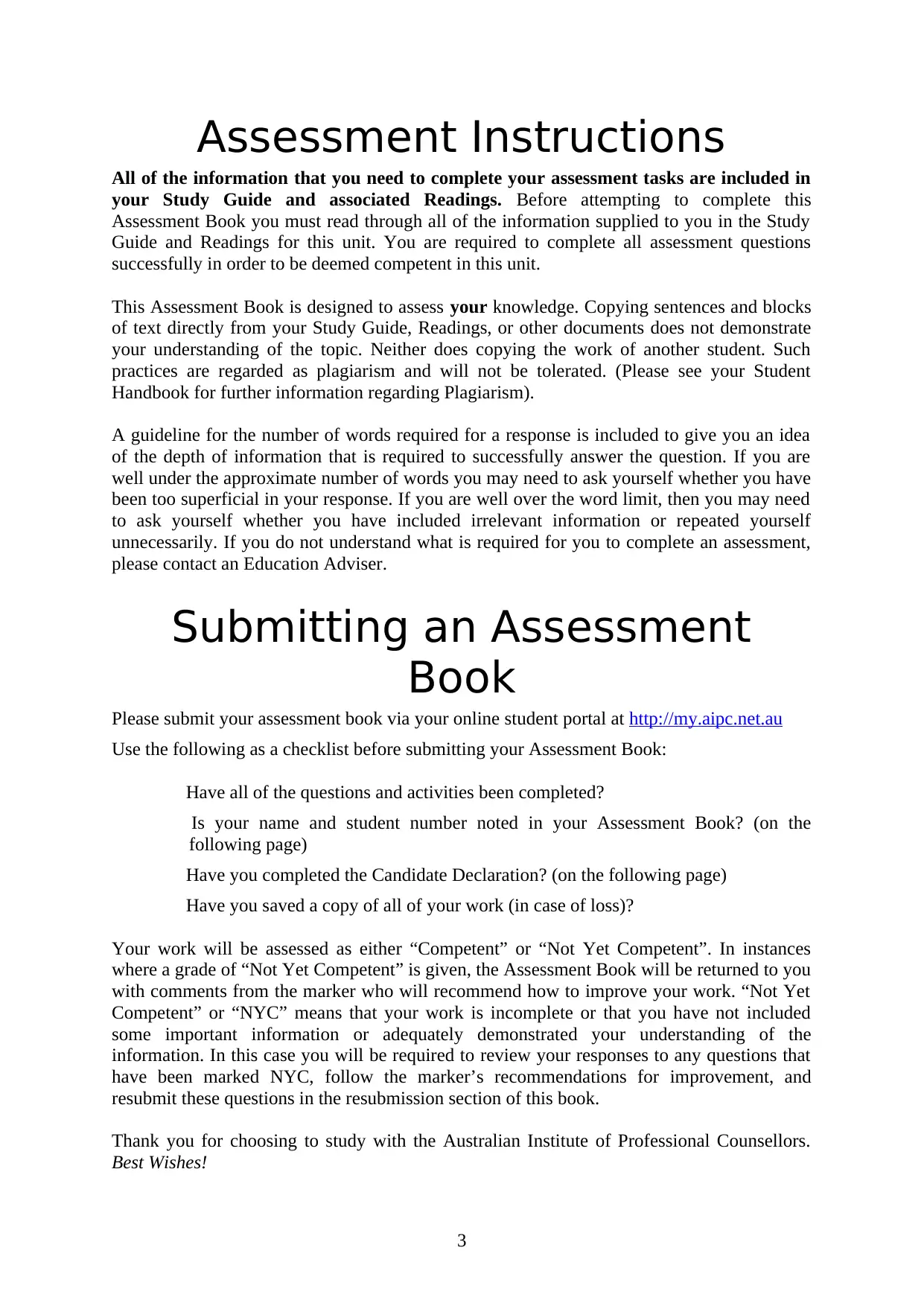
Assessment Instructions
All of the information that you need to complete your assessment tasks are included in
your Study Guide and associated Readings. Before attempting to complete this
Assessment Book you must read through all of the information supplied to you in the Study
Guide and Readings for this unit. You are required to complete all assessment questions
successfully in order to be deemed competent in this unit.
This Assessment Book is designed to assess your knowledge. Copying sentences and blocks
of text directly from your Study Guide, Readings, or other documents does not demonstrate
your understanding of the topic. Neither does copying the work of another student. Such
practices are regarded as plagiarism and will not be tolerated. (Please see your Student
Handbook for further information regarding Plagiarism).
A guideline for the number of words required for a response is included to give you an idea
of the depth of information that is required to successfully answer the question. If you are
well under the approximate number of words you may need to ask yourself whether you have
been too superficial in your response. If you are well over the word limit, then you may need
to ask yourself whether you have included irrelevant information or repeated yourself
unnecessarily. If you do not understand what is required for you to complete an assessment,
please contact an Education Adviser.
Submitting an Assessment
Book
Please submit your assessment book via your online student portal at http://my.aipc.net.au
Use the following as a checklist before submitting your Assessment Book:
Have all of the questions and activities been completed?
Is your name and student number noted in your Assessment Book? (on the
following page)
Have you completed the Candidate Declaration? (on the following page)
Have you saved a copy of all of your work (in case of loss)?
Your work will be assessed as either “Competent” or “Not Yet Competent”. In instances
where a grade of “Not Yet Competent” is given, the Assessment Book will be returned to you
with comments from the marker who will recommend how to improve your work. “Not Yet
Competent” or “NYC” means that your work is incomplete or that you have not included
some important information or adequately demonstrated your understanding of the
information. In this case you will be required to review your responses to any questions that
have been marked NYC, follow the marker’s recommendations for improvement, and
resubmit these questions in the resubmission section of this book.
Thank you for choosing to study with the Australian Institute of Professional Counsellors.
Best Wishes!
3
All of the information that you need to complete your assessment tasks are included in
your Study Guide and associated Readings. Before attempting to complete this
Assessment Book you must read through all of the information supplied to you in the Study
Guide and Readings for this unit. You are required to complete all assessment questions
successfully in order to be deemed competent in this unit.
This Assessment Book is designed to assess your knowledge. Copying sentences and blocks
of text directly from your Study Guide, Readings, or other documents does not demonstrate
your understanding of the topic. Neither does copying the work of another student. Such
practices are regarded as plagiarism and will not be tolerated. (Please see your Student
Handbook for further information regarding Plagiarism).
A guideline for the number of words required for a response is included to give you an idea
of the depth of information that is required to successfully answer the question. If you are
well under the approximate number of words you may need to ask yourself whether you have
been too superficial in your response. If you are well over the word limit, then you may need
to ask yourself whether you have included irrelevant information or repeated yourself
unnecessarily. If you do not understand what is required for you to complete an assessment,
please contact an Education Adviser.
Submitting an Assessment
Book
Please submit your assessment book via your online student portal at http://my.aipc.net.au
Use the following as a checklist before submitting your Assessment Book:
Have all of the questions and activities been completed?
Is your name and student number noted in your Assessment Book? (on the
following page)
Have you completed the Candidate Declaration? (on the following page)
Have you saved a copy of all of your work (in case of loss)?
Your work will be assessed as either “Competent” or “Not Yet Competent”. In instances
where a grade of “Not Yet Competent” is given, the Assessment Book will be returned to you
with comments from the marker who will recommend how to improve your work. “Not Yet
Competent” or “NYC” means that your work is incomplete or that you have not included
some important information or adequately demonstrated your understanding of the
information. In this case you will be required to review your responses to any questions that
have been marked NYC, follow the marker’s recommendations for improvement, and
resubmit these questions in the resubmission section of this book.
Thank you for choosing to study with the Australian Institute of Professional Counsellors.
Best Wishes!
3
⊘ This is a preview!⊘
Do you want full access?
Subscribe today to unlock all pages.

Trusted by 1+ million students worldwide

4
Paraphrase This Document
Need a fresh take? Get an instant paraphrase of this document with our AI Paraphraser
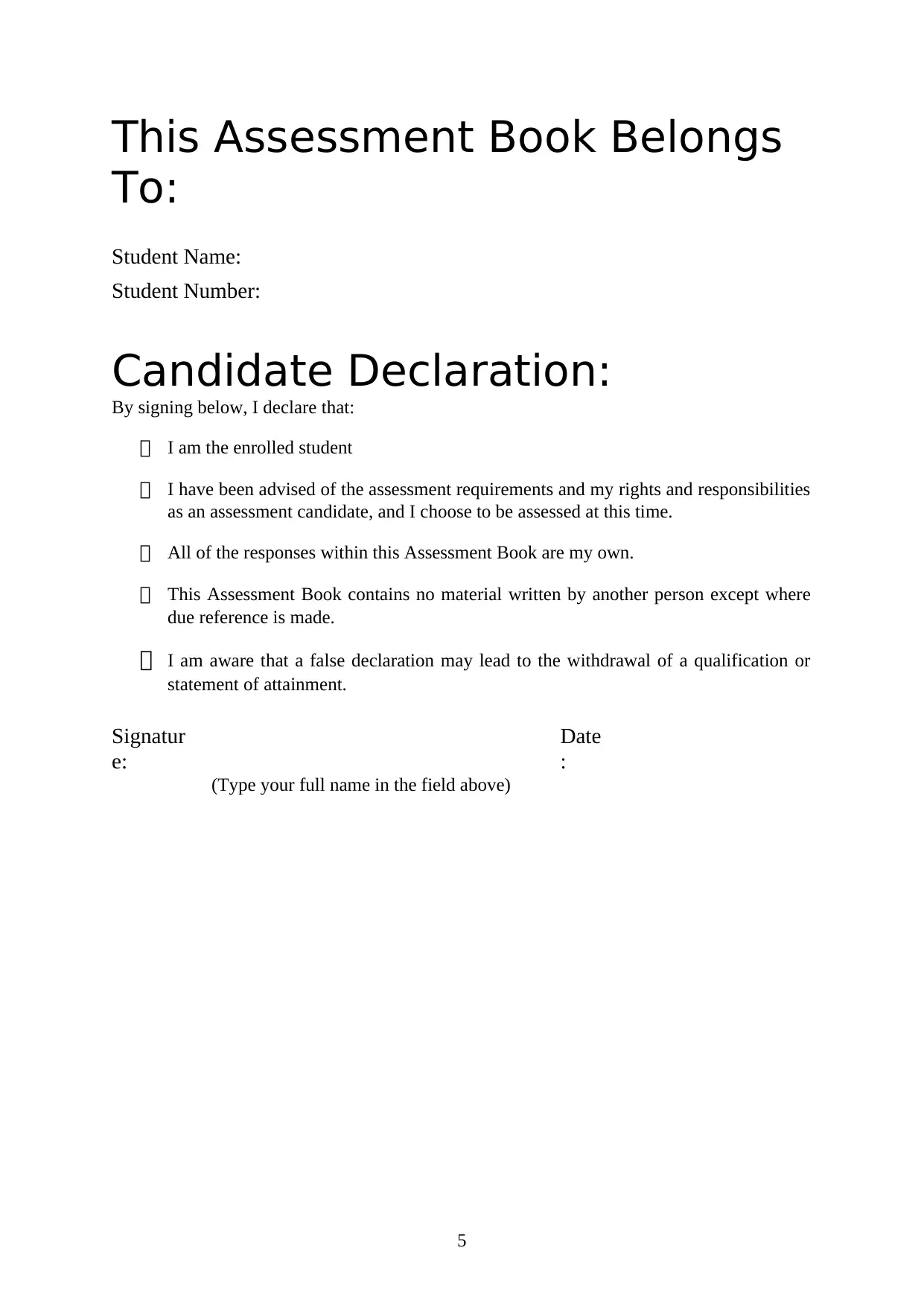
This Assessment Book Belongs
To:
Student Name:
Student Number:
Candidate Declaration:
By signing below, I declare that:
I am the enrolled student
I have been advised of the assessment requirements and my rights and responsibilities
as an assessment candidate, and I choose to be assessed at this time.
All of the responses within this Assessment Book are my own.
This Assessment Book contains no material written by another person except where
due reference is made.
I am aware that a false declaration may lead to the withdrawal of a qualification or
statement of attainment.
Signatur
e:
Date
:
(Type your full name in the field above)
5
To:
Student Name:
Student Number:
Candidate Declaration:
By signing below, I declare that:
I am the enrolled student
I have been advised of the assessment requirements and my rights and responsibilities
as an assessment candidate, and I choose to be assessed at this time.
All of the responses within this Assessment Book are my own.
This Assessment Book contains no material written by another person except where
due reference is made.
I am aware that a false declaration may lead to the withdrawal of a qualification or
statement of attainment.
Signatur
e:
Date
:
(Type your full name in the field above)
5
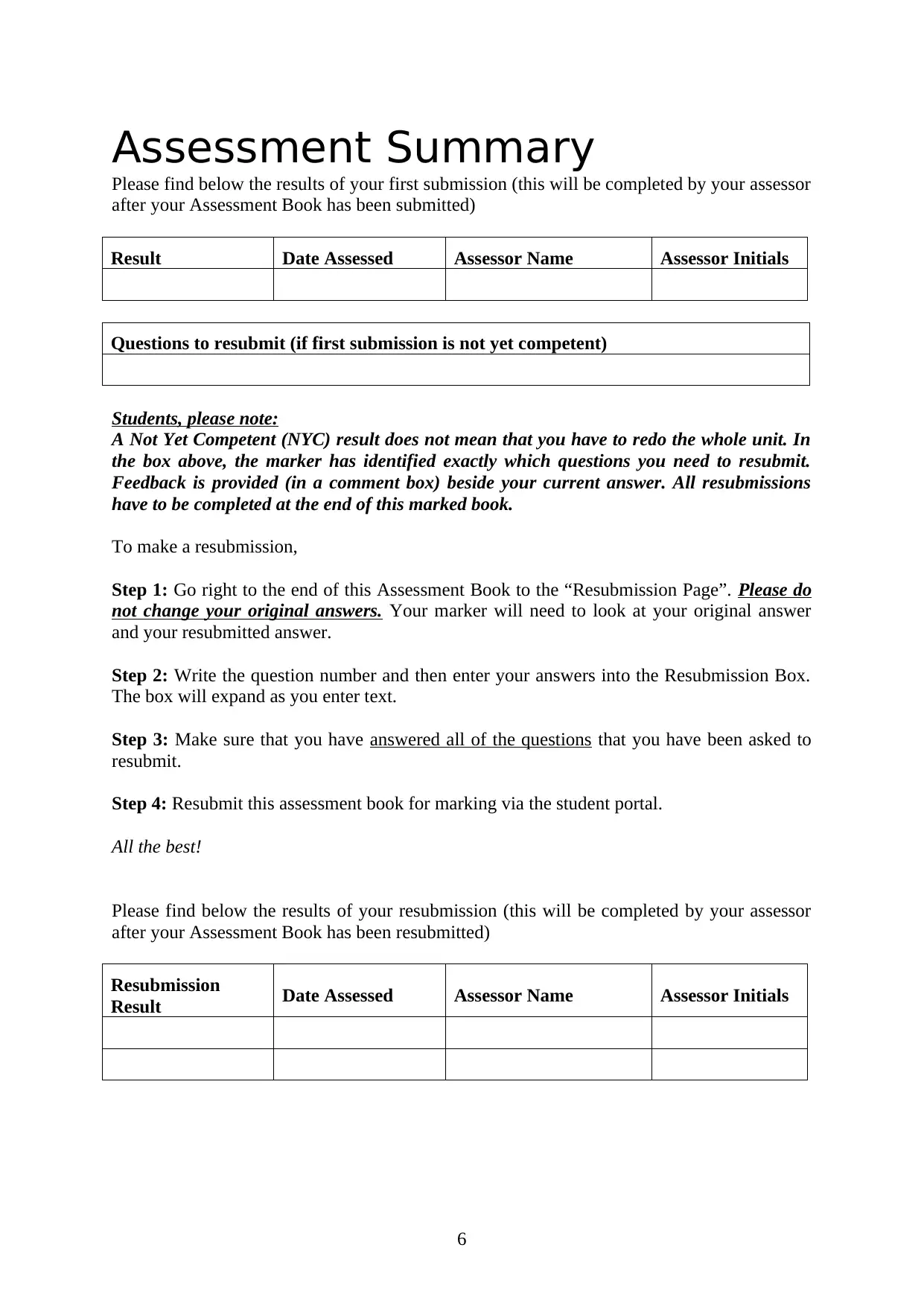
Assessment Summary
Please find below the results of your first submission (this will be completed by your assessor
after your Assessment Book has been submitted)
Result Date Assessed Assessor Name Assessor Initials
Questions to resubmit (if first submission is not yet competent)
Students, please note:
A Not Yet Competent (NYC) result does not mean that you have to redo the whole unit. In
the box above, the marker has identified exactly which questions you need to resubmit.
Feedback is provided (in a comment box) beside your current answer. All resubmissions
have to be completed at the end of this marked book.
To make a resubmission,
Step 1: Go right to the end of this Assessment Book to the “Resubmission Page”. Please do
not change your original answers. Your marker will need to look at your original answer
and your resubmitted answer.
Step 2: Write the question number and then enter your answers into the Resubmission Box.
The box will expand as you enter text.
Step 3: Make sure that you have answered all of the questions that you have been asked to
resubmit.
Step 4: Resubmit this assessment book for marking via the student portal.
All the best!
Please find below the results of your resubmission (this will be completed by your assessor
after your Assessment Book has been resubmitted)
Resubmission
Result Date Assessed Assessor Name Assessor Initials
6
Please find below the results of your first submission (this will be completed by your assessor
after your Assessment Book has been submitted)
Result Date Assessed Assessor Name Assessor Initials
Questions to resubmit (if first submission is not yet competent)
Students, please note:
A Not Yet Competent (NYC) result does not mean that you have to redo the whole unit. In
the box above, the marker has identified exactly which questions you need to resubmit.
Feedback is provided (in a comment box) beside your current answer. All resubmissions
have to be completed at the end of this marked book.
To make a resubmission,
Step 1: Go right to the end of this Assessment Book to the “Resubmission Page”. Please do
not change your original answers. Your marker will need to look at your original answer
and your resubmitted answer.
Step 2: Write the question number and then enter your answers into the Resubmission Box.
The box will expand as you enter text.
Step 3: Make sure that you have answered all of the questions that you have been asked to
resubmit.
Step 4: Resubmit this assessment book for marking via the student portal.
All the best!
Please find below the results of your resubmission (this will be completed by your assessor
after your Assessment Book has been resubmitted)
Resubmission
Result Date Assessed Assessor Name Assessor Initials
6
⊘ This is a preview!⊘
Do you want full access?
Subscribe today to unlock all pages.

Trusted by 1+ million students worldwide
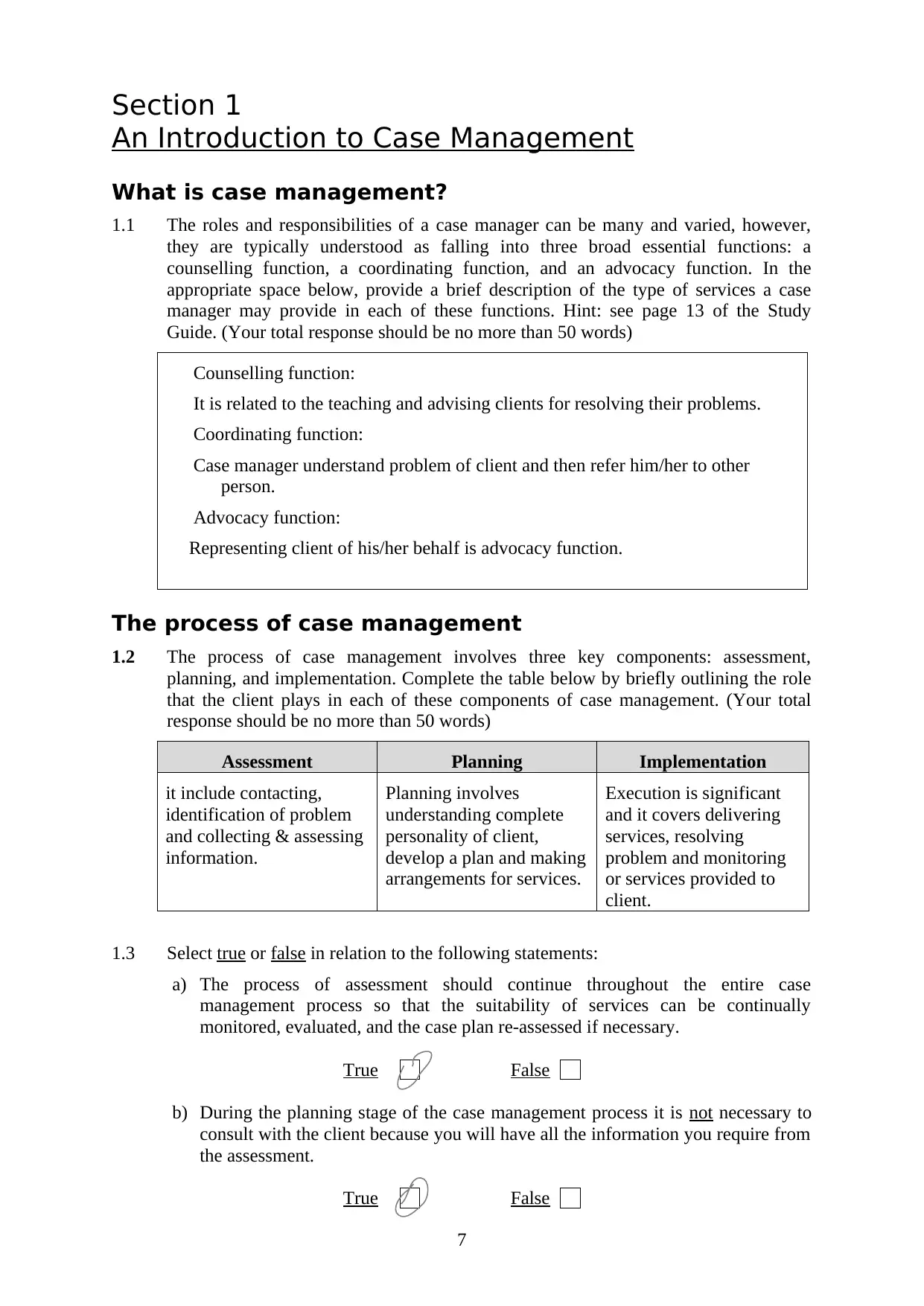
Section 1
An Introduction to Case Management
What is case management?
1.1 The roles and responsibilities of a case manager can be many and varied, however,
they are typically understood as falling into three broad essential functions: a
counselling function, a coordinating function, and an advocacy function. In the
appropriate space below, provide a brief description of the type of services a case
manager may provide in each of these functions. Hint: see page 13 of the Study
Guide. (Your total response should be no more than 50 words)
Counselling function:
It is related to the teaching and advising clients for resolving their problems.
Coordinating function:
Case manager understand problem of client and then refer him/her to other
person.
Advocacy function:
Representing client of his/her behalf is advocacy function.
The process of case management
1.2 The process of case management involves three key components: assessment,
planning, and implementation. Complete the table below by briefly outlining the role
that the client plays in each of these components of case management. (Your total
response should be no more than 50 words)
Assessment Planning Implementation
it include contacting,
identification of problem
and collecting & assessing
information.
Planning involves
understanding complete
personality of client,
develop a plan and making
arrangements for services.
Execution is significant
and it covers delivering
services, resolving
problem and monitoring
or services provided to
client.
1.3 Select true or false in relation to the following statements:
a) The process of assessment should continue throughout the entire case
management process so that the suitability of services can be continually
monitored, evaluated, and the case plan re-assessed if necessary.
True False
b) During the planning stage of the case management process it is not necessary to
consult with the client because you will have all the information you require from
the assessment.
True False
7
An Introduction to Case Management
What is case management?
1.1 The roles and responsibilities of a case manager can be many and varied, however,
they are typically understood as falling into three broad essential functions: a
counselling function, a coordinating function, and an advocacy function. In the
appropriate space below, provide a brief description of the type of services a case
manager may provide in each of these functions. Hint: see page 13 of the Study
Guide. (Your total response should be no more than 50 words)
Counselling function:
It is related to the teaching and advising clients for resolving their problems.
Coordinating function:
Case manager understand problem of client and then refer him/her to other
person.
Advocacy function:
Representing client of his/her behalf is advocacy function.
The process of case management
1.2 The process of case management involves three key components: assessment,
planning, and implementation. Complete the table below by briefly outlining the role
that the client plays in each of these components of case management. (Your total
response should be no more than 50 words)
Assessment Planning Implementation
it include contacting,
identification of problem
and collecting & assessing
information.
Planning involves
understanding complete
personality of client,
develop a plan and making
arrangements for services.
Execution is significant
and it covers delivering
services, resolving
problem and monitoring
or services provided to
client.
1.3 Select true or false in relation to the following statements:
a) The process of assessment should continue throughout the entire case
management process so that the suitability of services can be continually
monitored, evaluated, and the case plan re-assessed if necessary.
True False
b) During the planning stage of the case management process it is not necessary to
consult with the client because you will have all the information you require from
the assessment.
True False
7
Paraphrase This Document
Need a fresh take? Get an instant paraphrase of this document with our AI Paraphraser
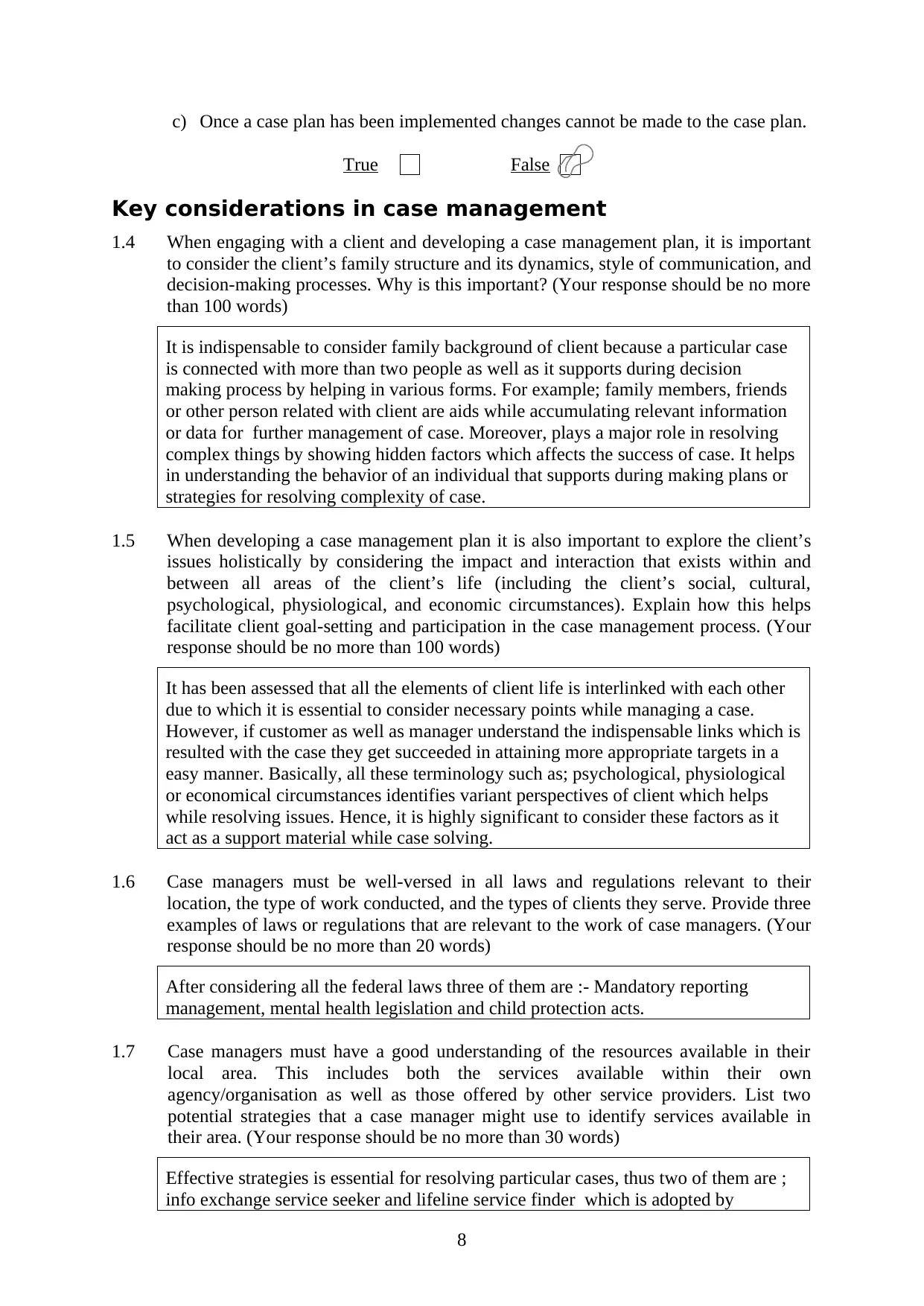
c) Once a case plan has been implemented changes cannot be made to the case plan.
True False
Key considerations in case management
1.4 When engaging with a client and developing a case management plan, it is important
to consider the client’s family structure and its dynamics, style of communication, and
decision-making processes. Why is this important? (Your response should be no more
than 100 words)
It is indispensable to consider family background of client because a particular case
is connected with more than two people as well as it supports during decision
making process by helping in various forms. For example; family members, friends
or other person related with client are aids while accumulating relevant information
or data for further management of case. Moreover, plays a major role in resolving
complex things by showing hidden factors which affects the success of case. It helps
in understanding the behavior of an individual that supports during making plans or
strategies for resolving complexity of case.
1.5 When developing a case management plan it is also important to explore the client’s
issues holistically by considering the impact and interaction that exists within and
between all areas of the client’s life (including the client’s social, cultural,
psychological, physiological, and economic circumstances). Explain how this helps
facilitate client goal-setting and participation in the case management process. (Your
response should be no more than 100 words)
It has been assessed that all the elements of client life is interlinked with each other
due to which it is essential to consider necessary points while managing a case.
However, if customer as well as manager understand the indispensable links which is
resulted with the case they get succeeded in attaining more appropriate targets in a
easy manner. Basically, all these terminology such as; psychological, physiological
or economical circumstances identifies variant perspectives of client which helps
while resolving issues. Hence, it is highly significant to consider these factors as it
act as a support material while case solving.
1.6 Case managers must be well-versed in all laws and regulations relevant to their
location, the type of work conducted, and the types of clients they serve. Provide three
examples of laws or regulations that are relevant to the work of case managers. (Your
response should be no more than 20 words)
After considering all the federal laws three of them are :- Mandatory reporting
management, mental health legislation and child protection acts.
1.7 Case managers must have a good understanding of the resources available in their
local area. This includes both the services available within their own
agency/organisation as well as those offered by other service providers. List two
potential strategies that a case manager might use to identify services available in
their area. (Your response should be no more than 30 words)
Effective strategies is essential for resolving particular cases, thus two of them are ;
info exchange service seeker and lifeline service finder which is adopted by
8
True False
Key considerations in case management
1.4 When engaging with a client and developing a case management plan, it is important
to consider the client’s family structure and its dynamics, style of communication, and
decision-making processes. Why is this important? (Your response should be no more
than 100 words)
It is indispensable to consider family background of client because a particular case
is connected with more than two people as well as it supports during decision
making process by helping in various forms. For example; family members, friends
or other person related with client are aids while accumulating relevant information
or data for further management of case. Moreover, plays a major role in resolving
complex things by showing hidden factors which affects the success of case. It helps
in understanding the behavior of an individual that supports during making plans or
strategies for resolving complexity of case.
1.5 When developing a case management plan it is also important to explore the client’s
issues holistically by considering the impact and interaction that exists within and
between all areas of the client’s life (including the client’s social, cultural,
psychological, physiological, and economic circumstances). Explain how this helps
facilitate client goal-setting and participation in the case management process. (Your
response should be no more than 100 words)
It has been assessed that all the elements of client life is interlinked with each other
due to which it is essential to consider necessary points while managing a case.
However, if customer as well as manager understand the indispensable links which is
resulted with the case they get succeeded in attaining more appropriate targets in a
easy manner. Basically, all these terminology such as; psychological, physiological
or economical circumstances identifies variant perspectives of client which helps
while resolving issues. Hence, it is highly significant to consider these factors as it
act as a support material while case solving.
1.6 Case managers must be well-versed in all laws and regulations relevant to their
location, the type of work conducted, and the types of clients they serve. Provide three
examples of laws or regulations that are relevant to the work of case managers. (Your
response should be no more than 20 words)
After considering all the federal laws three of them are :- Mandatory reporting
management, mental health legislation and child protection acts.
1.7 Case managers must have a good understanding of the resources available in their
local area. This includes both the services available within their own
agency/organisation as well as those offered by other service providers. List two
potential strategies that a case manager might use to identify services available in
their area. (Your response should be no more than 30 words)
Effective strategies is essential for resolving particular cases, thus two of them are ;
info exchange service seeker and lifeline service finder which is adopted by
8
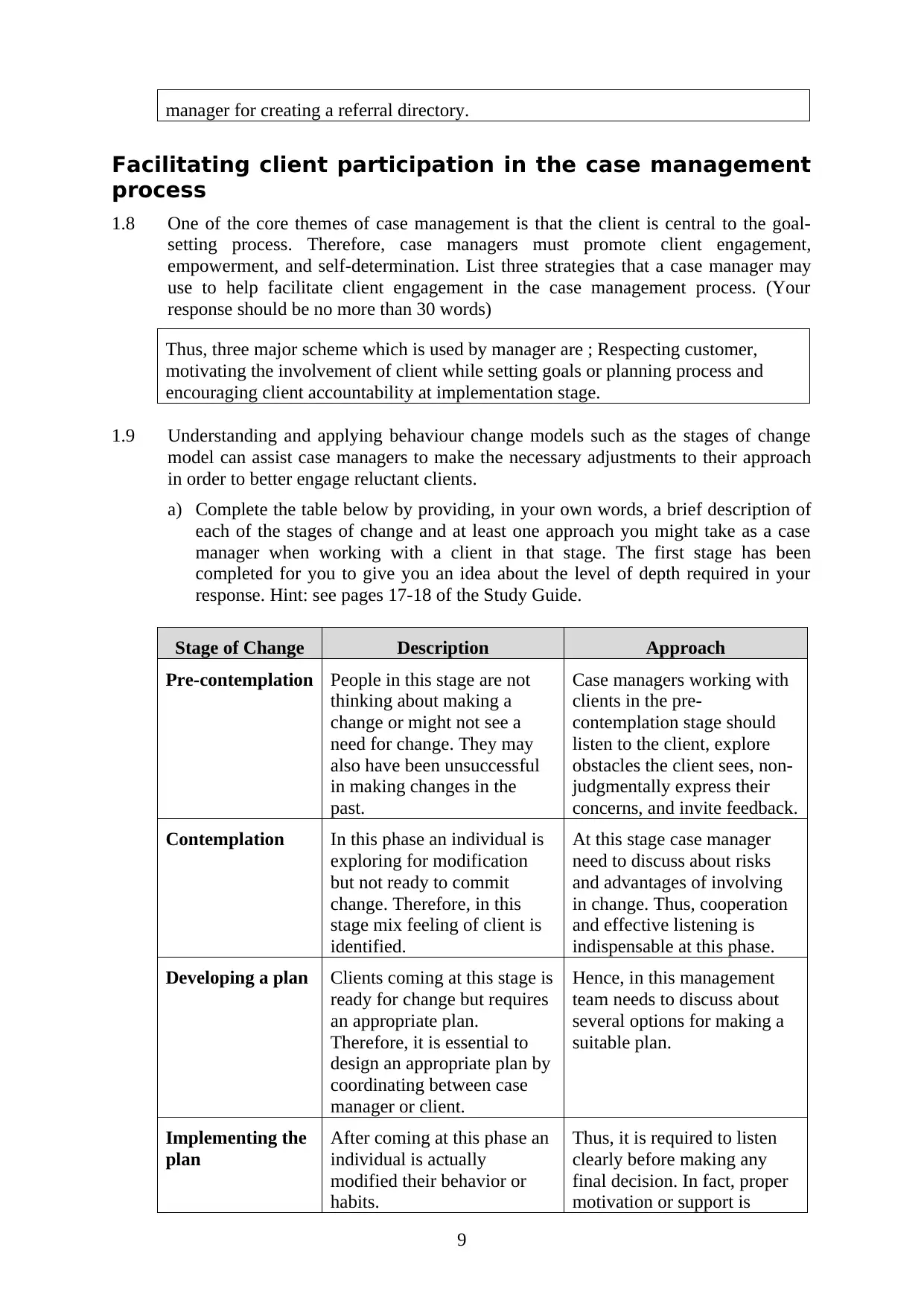
manager for creating a referral directory.
Facilitating client participation in the case management
process
1.8 One of the core themes of case management is that the client is central to the goal-
setting process. Therefore, case managers must promote client engagement,
empowerment, and self-determination. List three strategies that a case manager may
use to help facilitate client engagement in the case management process. (Your
response should be no more than 30 words)
Thus, three major scheme which is used by manager are ; Respecting customer,
motivating the involvement of client while setting goals or planning process and
encouraging client accountability at implementation stage.
1.9 Understanding and applying behaviour change models such as the stages of change
model can assist case managers to make the necessary adjustments to their approach
in order to better engage reluctant clients.
a) Complete the table below by providing, in your own words, a brief description of
each of the stages of change and at least one approach you might take as a case
manager when working with a client in that stage. The first stage has been
completed for you to give you an idea about the level of depth required in your
response. Hint: see pages 17-18 of the Study Guide.
Stage of Change Description Approach
Pre-contemplation People in this stage are not
thinking about making a
change or might not see a
need for change. They may
also have been unsuccessful
in making changes in the
past.
Case managers working with
clients in the pre-
contemplation stage should
listen to the client, explore
obstacles the client sees, non-
judgmentally express their
concerns, and invite feedback.
Contemplation In this phase an individual is
exploring for modification
but not ready to commit
change. Therefore, in this
stage mix feeling of client is
identified.
At this stage case manager
need to discuss about risks
and advantages of involving
in change. Thus, cooperation
and effective listening is
indispensable at this phase.
Developing a plan Clients coming at this stage is
ready for change but requires
an appropriate plan.
Therefore, it is essential to
design an appropriate plan by
coordinating between case
manager or client.
Hence, in this management
team needs to discuss about
several options for making a
suitable plan.
Implementing the
plan
After coming at this phase an
individual is actually
modified their behavior or
habits.
Thus, it is required to listen
clearly before making any
final decision. In fact, proper
motivation or support is
9
Facilitating client participation in the case management
process
1.8 One of the core themes of case management is that the client is central to the goal-
setting process. Therefore, case managers must promote client engagement,
empowerment, and self-determination. List three strategies that a case manager may
use to help facilitate client engagement in the case management process. (Your
response should be no more than 30 words)
Thus, three major scheme which is used by manager are ; Respecting customer,
motivating the involvement of client while setting goals or planning process and
encouraging client accountability at implementation stage.
1.9 Understanding and applying behaviour change models such as the stages of change
model can assist case managers to make the necessary adjustments to their approach
in order to better engage reluctant clients.
a) Complete the table below by providing, in your own words, a brief description of
each of the stages of change and at least one approach you might take as a case
manager when working with a client in that stage. The first stage has been
completed for you to give you an idea about the level of depth required in your
response. Hint: see pages 17-18 of the Study Guide.
Stage of Change Description Approach
Pre-contemplation People in this stage are not
thinking about making a
change or might not see a
need for change. They may
also have been unsuccessful
in making changes in the
past.
Case managers working with
clients in the pre-
contemplation stage should
listen to the client, explore
obstacles the client sees, non-
judgmentally express their
concerns, and invite feedback.
Contemplation In this phase an individual is
exploring for modification
but not ready to commit
change. Therefore, in this
stage mix feeling of client is
identified.
At this stage case manager
need to discuss about risks
and advantages of involving
in change. Thus, cooperation
and effective listening is
indispensable at this phase.
Developing a plan Clients coming at this stage is
ready for change but requires
an appropriate plan.
Therefore, it is essential to
design an appropriate plan by
coordinating between case
manager or client.
Hence, in this management
team needs to discuss about
several options for making a
suitable plan.
Implementing the
plan
After coming at this phase an
individual is actually
modified their behavior or
habits.
Thus, it is required to listen
clearly before making any
final decision. In fact, proper
motivation or support is
9
⊘ This is a preview!⊘
Do you want full access?
Subscribe today to unlock all pages.

Trusted by 1+ million students worldwide
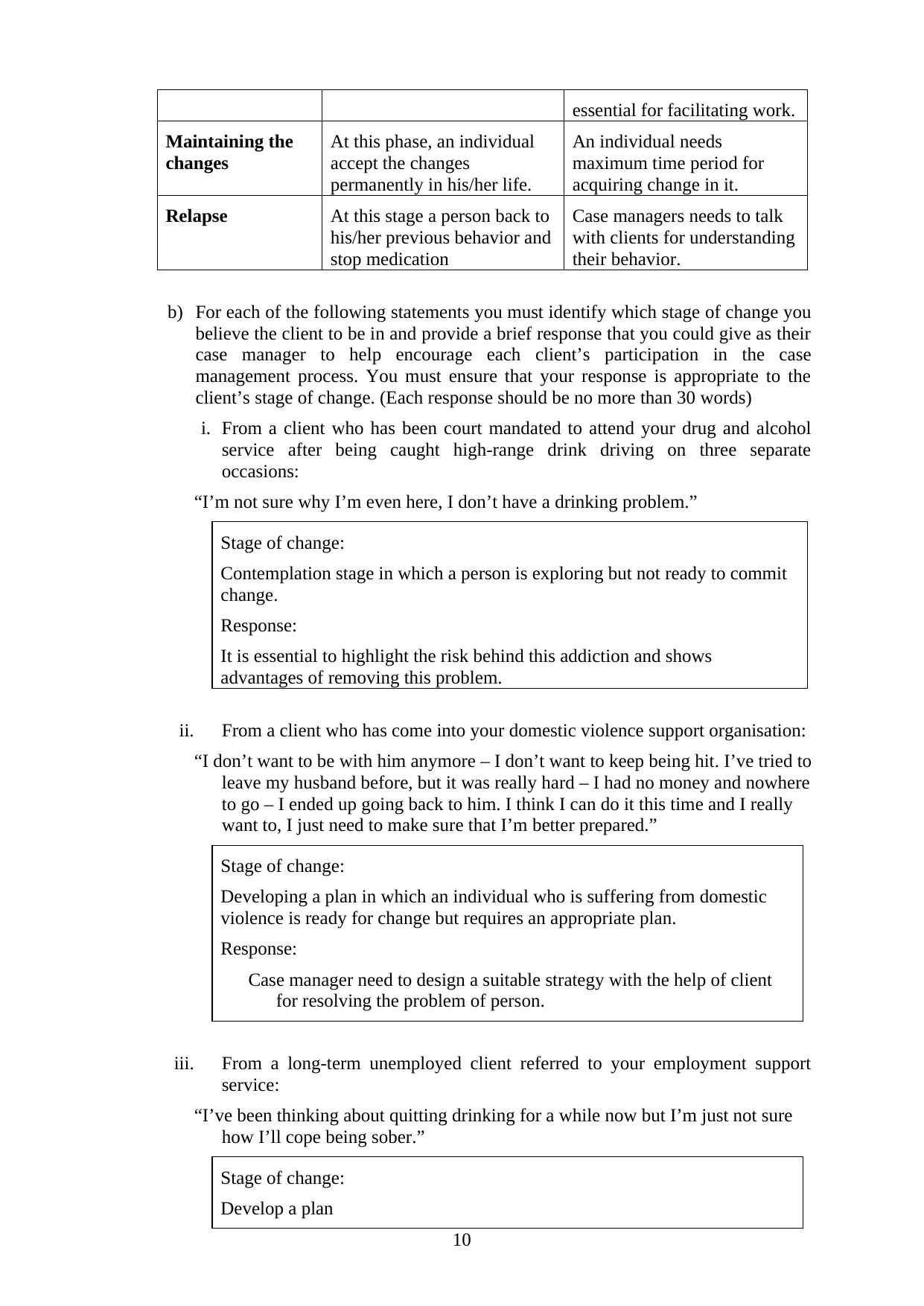
essential for facilitating work.
Maintaining the
changes
At this phase, an individual
accept the changes
permanently in his/her life.
An individual needs
maximum time period for
acquiring change in it.
Relapse At this stage a person back to
his/her previous behavior and
stop medication
Case managers needs to talk
with clients for understanding
their behavior.
b) For each of the following statements you must identify which stage of change you
believe the client to be in and provide a brief response that you could give as their
case manager to help encourage each client’s participation in the case
management process. You must ensure that your response is appropriate to the
client’s stage of change. (Each response should be no more than 30 words)
i. From a client who has been court mandated to attend your drug and alcohol
service after being caught high-range drink driving on three separate
occasions:
“I’m not sure why I’m even here, I don’t have a drinking problem.”
Stage of change:
Contemplation stage in which a person is exploring but not ready to commit
change.
Response:
It is essential to highlight the risk behind this addiction and shows
advantages of removing this problem.
ii. From a client who has come into your domestic violence support organisation:
“I don’t want to be with him anymore – I don’t want to keep being hit. I’ve tried to
leave my husband before, but it was really hard – I had no money and nowhere
to go – I ended up going back to him. I think I can do it this time and I really
want to, I just need to make sure that I’m better prepared.”
Stage of change:
Developing a plan in which an individual who is suffering from domestic
violence is ready for change but requires an appropriate plan.
Response:
Case manager need to design a suitable strategy with the help of client
for resolving the problem of person.
iii. From a long-term unemployed client referred to your employment support
service:
“I’ve been thinking about quitting drinking for a while now but I’m just not sure
how I’ll cope being sober.”
Stage of change:
Develop a plan
10
Maintaining the
changes
At this phase, an individual
accept the changes
permanently in his/her life.
An individual needs
maximum time period for
acquiring change in it.
Relapse At this stage a person back to
his/her previous behavior and
stop medication
Case managers needs to talk
with clients for understanding
their behavior.
b) For each of the following statements you must identify which stage of change you
believe the client to be in and provide a brief response that you could give as their
case manager to help encourage each client’s participation in the case
management process. You must ensure that your response is appropriate to the
client’s stage of change. (Each response should be no more than 30 words)
i. From a client who has been court mandated to attend your drug and alcohol
service after being caught high-range drink driving on three separate
occasions:
“I’m not sure why I’m even here, I don’t have a drinking problem.”
Stage of change:
Contemplation stage in which a person is exploring but not ready to commit
change.
Response:
It is essential to highlight the risk behind this addiction and shows
advantages of removing this problem.
ii. From a client who has come into your domestic violence support organisation:
“I don’t want to be with him anymore – I don’t want to keep being hit. I’ve tried to
leave my husband before, but it was really hard – I had no money and nowhere
to go – I ended up going back to him. I think I can do it this time and I really
want to, I just need to make sure that I’m better prepared.”
Stage of change:
Developing a plan in which an individual who is suffering from domestic
violence is ready for change but requires an appropriate plan.
Response:
Case manager need to design a suitable strategy with the help of client
for resolving the problem of person.
iii. From a long-term unemployed client referred to your employment support
service:
“I’ve been thinking about quitting drinking for a while now but I’m just not sure
how I’ll cope being sober.”
Stage of change:
Develop a plan
10
Paraphrase This Document
Need a fresh take? Get an instant paraphrase of this document with our AI Paraphraser
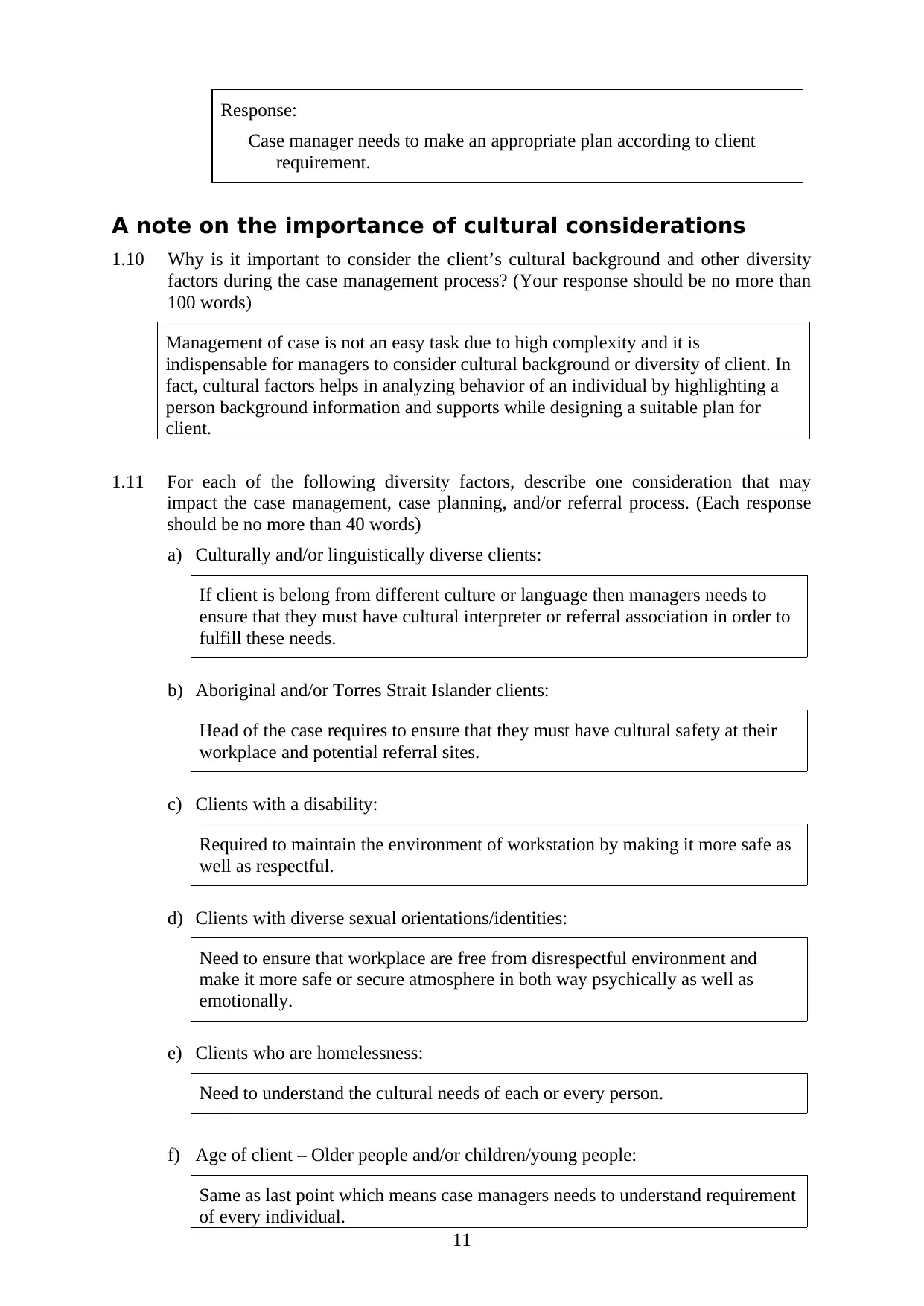
Response:
Case manager needs to make an appropriate plan according to client
requirement.
A note on the importance of cultural considerations
1.10 Why is it important to consider the client’s cultural background and other diversity
factors during the case management process? (Your response should be no more than
100 words)
Management of case is not an easy task due to high complexity and it is
indispensable for managers to consider cultural background or diversity of client. In
fact, cultural factors helps in analyzing behavior of an individual by highlighting a
person background information and supports while designing a suitable plan for
client.
1.11 For each of the following diversity factors, describe one consideration that may
impact the case management, case planning, and/or referral process. (Each response
should be no more than 40 words)
a) Culturally and/or linguistically diverse clients:
If client is belong from different culture or language then managers needs to
ensure that they must have cultural interpreter or referral association in order to
fulfill these needs.
b) Aboriginal and/or Torres Strait Islander clients:
Head of the case requires to ensure that they must have cultural safety at their
workplace and potential referral sites.
c) Clients with a disability:
Required to maintain the environment of workstation by making it more safe as
well as respectful.
d) Clients with diverse sexual orientations/identities:
Need to ensure that workplace are free from disrespectful environment and
make it more safe or secure atmosphere in both way psychically as well as
emotionally.
e) Clients who are homelessness:
Need to understand the cultural needs of each or every person.
f) Age of client – Older people and/or children/young people:
Same as last point which means case managers needs to understand requirement
of every individual.
11
Case manager needs to make an appropriate plan according to client
requirement.
A note on the importance of cultural considerations
1.10 Why is it important to consider the client’s cultural background and other diversity
factors during the case management process? (Your response should be no more than
100 words)
Management of case is not an easy task due to high complexity and it is
indispensable for managers to consider cultural background or diversity of client. In
fact, cultural factors helps in analyzing behavior of an individual by highlighting a
person background information and supports while designing a suitable plan for
client.
1.11 For each of the following diversity factors, describe one consideration that may
impact the case management, case planning, and/or referral process. (Each response
should be no more than 40 words)
a) Culturally and/or linguistically diverse clients:
If client is belong from different culture or language then managers needs to
ensure that they must have cultural interpreter or referral association in order to
fulfill these needs.
b) Aboriginal and/or Torres Strait Islander clients:
Head of the case requires to ensure that they must have cultural safety at their
workplace and potential referral sites.
c) Clients with a disability:
Required to maintain the environment of workstation by making it more safe as
well as respectful.
d) Clients with diverse sexual orientations/identities:
Need to ensure that workplace are free from disrespectful environment and
make it more safe or secure atmosphere in both way psychically as well as
emotionally.
e) Clients who are homelessness:
Need to understand the cultural needs of each or every person.
f) Age of client – Older people and/or children/young people:
Same as last point which means case managers needs to understand requirement
of every individual.
11
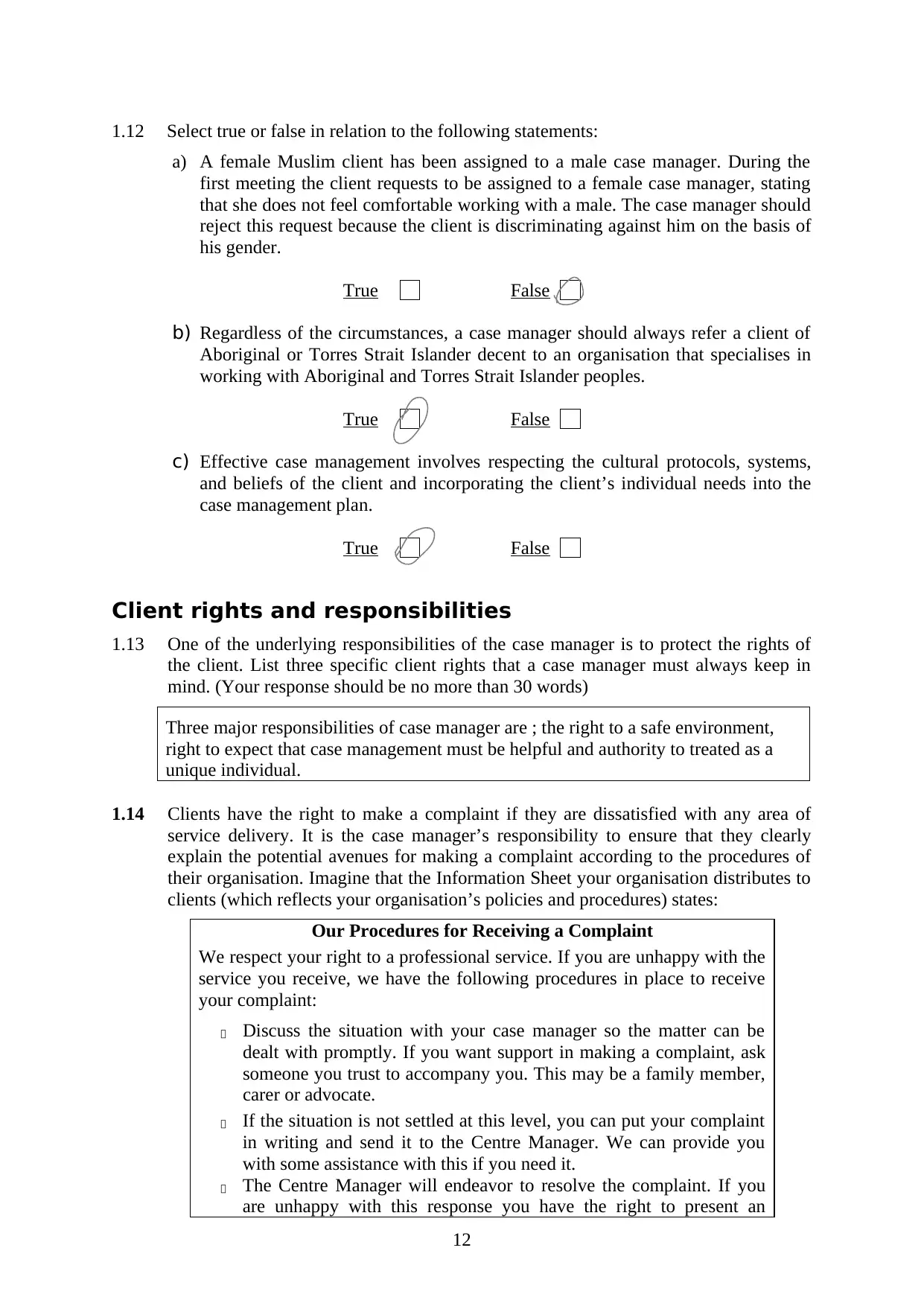
1.12 Select true or false in relation to the following statements:
a) A female Muslim client has been assigned to a male case manager. During the
first meeting the client requests to be assigned to a female case manager, stating
that she does not feel comfortable working with a male. The case manager should
reject this request because the client is discriminating against him on the basis of
his gender.
True False
b) Regardless of the circumstances, a case manager should always refer a client of
Aboriginal or Torres Strait Islander decent to an organisation that specialises in
working with Aboriginal and Torres Strait Islander peoples.
True False
c) Effective case management involves respecting the cultural protocols, systems,
and beliefs of the client and incorporating the client’s individual needs into the
case management plan.
True False
Client rights and responsibilities
1.13 One of the underlying responsibilities of the case manager is to protect the rights of
the client. List three specific client rights that a case manager must always keep in
mind. (Your response should be no more than 30 words)
Three major responsibilities of case manager are ; the right to a safe environment,
right to expect that case management must be helpful and authority to treated as a
unique individual.
1.14 Clients have the right to make a complaint if they are dissatisfied with any area of
service delivery. It is the case manager’s responsibility to ensure that they clearly
explain the potential avenues for making a complaint according to the procedures of
their organisation. Imagine that the Information Sheet your organisation distributes to
clients (which reflects your organisation’s policies and procedures) states:
Our Procedures for Receiving a Complaint
We respect your right to a professional service. If you are unhappy with the
service you receive, we have the following procedures in place to receive
your complaint:
Discuss the situation with your case manager so the matter can be
dealt with promptly. If you want support in making a complaint, ask
someone you trust to accompany you. This may be a family member,
carer or advocate.
If the situation is not settled at this level, you can put your complaint
in writing and send it to the Centre Manager. We can provide you
with some assistance with this if you need it.
The Centre Manager will endeavor to resolve the complaint. If you
are unhappy with this response you have the right to present an
12
a) A female Muslim client has been assigned to a male case manager. During the
first meeting the client requests to be assigned to a female case manager, stating
that she does not feel comfortable working with a male. The case manager should
reject this request because the client is discriminating against him on the basis of
his gender.
True False
b) Regardless of the circumstances, a case manager should always refer a client of
Aboriginal or Torres Strait Islander decent to an organisation that specialises in
working with Aboriginal and Torres Strait Islander peoples.
True False
c) Effective case management involves respecting the cultural protocols, systems,
and beliefs of the client and incorporating the client’s individual needs into the
case management plan.
True False
Client rights and responsibilities
1.13 One of the underlying responsibilities of the case manager is to protect the rights of
the client. List three specific client rights that a case manager must always keep in
mind. (Your response should be no more than 30 words)
Three major responsibilities of case manager are ; the right to a safe environment,
right to expect that case management must be helpful and authority to treated as a
unique individual.
1.14 Clients have the right to make a complaint if they are dissatisfied with any area of
service delivery. It is the case manager’s responsibility to ensure that they clearly
explain the potential avenues for making a complaint according to the procedures of
their organisation. Imagine that the Information Sheet your organisation distributes to
clients (which reflects your organisation’s policies and procedures) states:
Our Procedures for Receiving a Complaint
We respect your right to a professional service. If you are unhappy with the
service you receive, we have the following procedures in place to receive
your complaint:
Discuss the situation with your case manager so the matter can be
dealt with promptly. If you want support in making a complaint, ask
someone you trust to accompany you. This may be a family member,
carer or advocate.
If the situation is not settled at this level, you can put your complaint
in writing and send it to the Centre Manager. We can provide you
with some assistance with this if you need it.
The Centre Manager will endeavor to resolve the complaint. If you
are unhappy with this response you have the right to present an
12
⊘ This is a preview!⊘
Do you want full access?
Subscribe today to unlock all pages.

Trusted by 1+ million students worldwide
1 out of 45
Related Documents
Your All-in-One AI-Powered Toolkit for Academic Success.
+13062052269
info@desklib.com
Available 24*7 on WhatsApp / Email
![[object Object]](/_next/static/media/star-bottom.7253800d.svg)
Unlock your academic potential
Copyright © 2020–2026 A2Z Services. All Rights Reserved. Developed and managed by ZUCOL.





